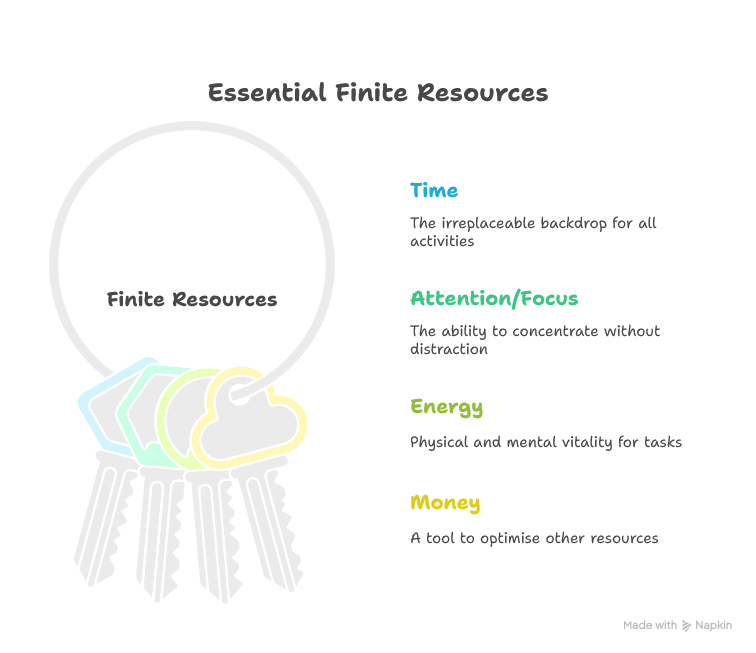As you explore productivity and time management, you’ll often find advice on scheduling and task management to boost efficiency.
These techniques can be valuable, but you’ll gain even more from them once you realise that productivity is fundamentally about managing finite resources.
Time management isn’t the only finite resource in productivity
Time management can be misleading, suggesting productivity is solely about managing time. Actually, time is just one of several finite resources we need to manage, including:
- Time: The ultimate finite resource, as it’s the only one we cannot replenish. Once time is gone, it’s gone. It acts as a backdrop for the other finite resources.
- Attention/Focus: Our ability to concentrate on tasks without distraction. This is crucial for deep work and complex problem-solving.
- Energy: Both physical and mental energy are essential for getting things done. Without sufficient energy, even simple tasks can feel overwhelming.
- Money: Can be invested at times to save time, attention or energy. Think of it as a tool to optimise your other resources.

While time cannot be replenished, the other three can be replenished over time.
Each day, your energy and attention are replenished through rest, exercise and proper nutrition. Consequently, some days you’ll have more reserves than others. These resources also fluctuate throughout the day, with peaks and troughs. It’s beneficial to keep a journal for a while to identify your own natural rhythms.
This will help you pinpoint the times of day when you have the most energy and focus, which is when you should schedule your most important and demanding tasks. Less demanding tasks can then be scheduled for periods when your energy and focus are lower.
How I Manage My Finite Resources: Time, Energy and Attention
I organise my time to tackle the most important task first. Outside of my job, that’s writing. I’m committed to publishing at least one blog post and one newsletter each week. You can sign up for our weekly newsletter here.
Because this is important to me and requires a high level of focus, I aim to do it when my attention is at its peak, which is usually in the morning after waking up.
Later in the day, when my energy is lower, I focus on easier tasks or administrative work, such as reading emails, working on my notes or exploring other topics.
I also make sure to dedicate time to relaxation and rest, allowing me to recharge my energy and mental focus. This also allows the mind to absorb and process information more effectively, potentially leading to ‘eureka’ moments.
The key is to prioritise the tasks that will likely have the biggest impact and require the most resources, and to tackle those tasks when you’re most likely to have the necessary resources available.
The Role of Money
Money differs from other resources; unlike time, replenishing it often takes longer than replenishing energy or attention. Careful planning is needed to allocate it across needs and projects, some vital for survival, like housing and food.
Chris Bailey, in ‘The Productive Project’, suggests calculating the value of your time by asking yourself how much money you’d spend to buy back an hour of your life. I often rephrase this question and ask: how much would I spend to save an hour?
I’ve read arguments suggesting that you should set a fixed hourly rate at a high value to inspire you, and I understand the logic. However, this advice often comes from people who are already successful.
I have two values: an aspirational one, and another I use for practical decisions. For example, I decided to subscribe to Readwise and Obsidian Copilot based on how much time I thought they would save me, and how much I could afford to ‘buy back’ those hours.
Therefore, I suggest you calculate how much you’d be willing to spend, given your current financial situation, to buy back an hour.
Conclusion
In summary, the key takeaways are:
- Prioritise tasks based on your energy levels: Schedule focused work for when you’re most alert.
- Protect your attention: Minimise distractions and create dedicated focus time.
- Invest in energy management: Ensure you get enough sleep, eat well and exercise.
- Delegate or outsource tasks: Recognise when spending money you can afford could free up your time, energy or focus.
Also, regularly review your processes, as your requirements will change over time.
Why not try managing more than just your time? You can start now by noting down, over the next week or two, how much energy and focus you have each hour of the day. This will help you understand when you’re best equipped to tackle your most important tasks.
